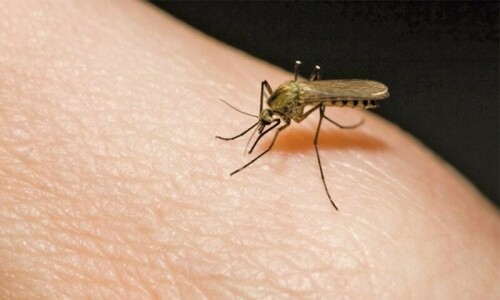KARACHI, Jan 4: The numbers of hog deer, gray partridges, wild boars, jackals, jungle cats, Bengal foxes and mongooses are fast declining in Nawabshah’s Pai forest due to poaching by influential people.
Sources at the World Wide Fund for Nature (WWF) say that only a few hog deer are left in the entire forest. A large number of hog deer have been hunted by feudal lords and bureaucrats, while high profile foreign personalities, particularly from the Middle East, have been invited to hunt game animals in the forest on several occasions.
Despite the fact that the Pai forest has been declared a game reserve and is thus protected, poaching has not been stopped in the area. The Pai forest was once a natural riverine forest, but it has now become separated from the Indus River after a flood protection embankment was built, the sources said.
“Gray partridges are being over-hunted, and local influential people break the sanctioned hunting limit often. Every year, new beats are made in the forest for hunting. This involves levelling the land in selected forest areas and planting new trees. Cotton is grown in these levelled areas, since pests which attack cotton tend to attract partridges, who feed on them,” they said, adding there are now hardly any black partridges at all in the forest.
The sources said a number of colourful birds could be found in the Pai forest. The more common species are dovers, bee-eaters, larks and parakeets. There are also several migratory birds which stop at the forest, including the green pigeon. It appears that due to deforestation in the area, the Pai forest has become a sanctuary for these birds.
Honeybees are also found naturally in the Pai forest, and work needs to be done to collect honey from their hives. At present, there is virtually no collection of this pure, organic honey.The Pai forest is now under threat from both local communities, who cut trees for fuel, and influential people who wish to benefit from illegal encroachments.
Locals often allow their animals to graze in the forest. The cattle in this area are considered to be among the best in Pakistan.
There is also a serious water shortage in the Rahib Shah Minor canal, which is meant to provide the forest with irrigation water.
Influential landlords have siphoned off water from the canal for their own use, leaving the Pai forest (located at the tail end of the canal) with hardly any water. Landlords are now also slowly encroaching upon Pai forest land.
There are about 25 villages located adjacent to the forest. These villages have a mix of ethnic groups, including Sindhi Samat castes and Baloch, Punjabi and Seraiki tribes. The WWF-Pakistan has signed several Memoranda of Understanding with these communities to protect the Pai forest.
The WWF staff is currently encouraging civil society organisations to save the forest. “We alone can not stop hunting in the the Pai forest, so we want the local communities to be involved in it,” said a site manager of the Indus for All programmes in Nawabshah.
The Sindh province owns 0.241 million hectares of riverine forests, which are about 1.7 percent of the total land cover of the province. These forests are one of the most important ecosystems in Sindh, and their survival rests on annual regular inundation from the Indus River during the monsoons.
A variety of game animals and birds are found in these forests. The plant species found in these forests include Kandi, Lawa, Lai, Bahan and Babul. These forests, once part of a highly productive ecosystem, are now in a dismal state, particularly in lower Sindh.—PPI














































Dear visitor, the comments section is undergoing an overhaul and will return soon.